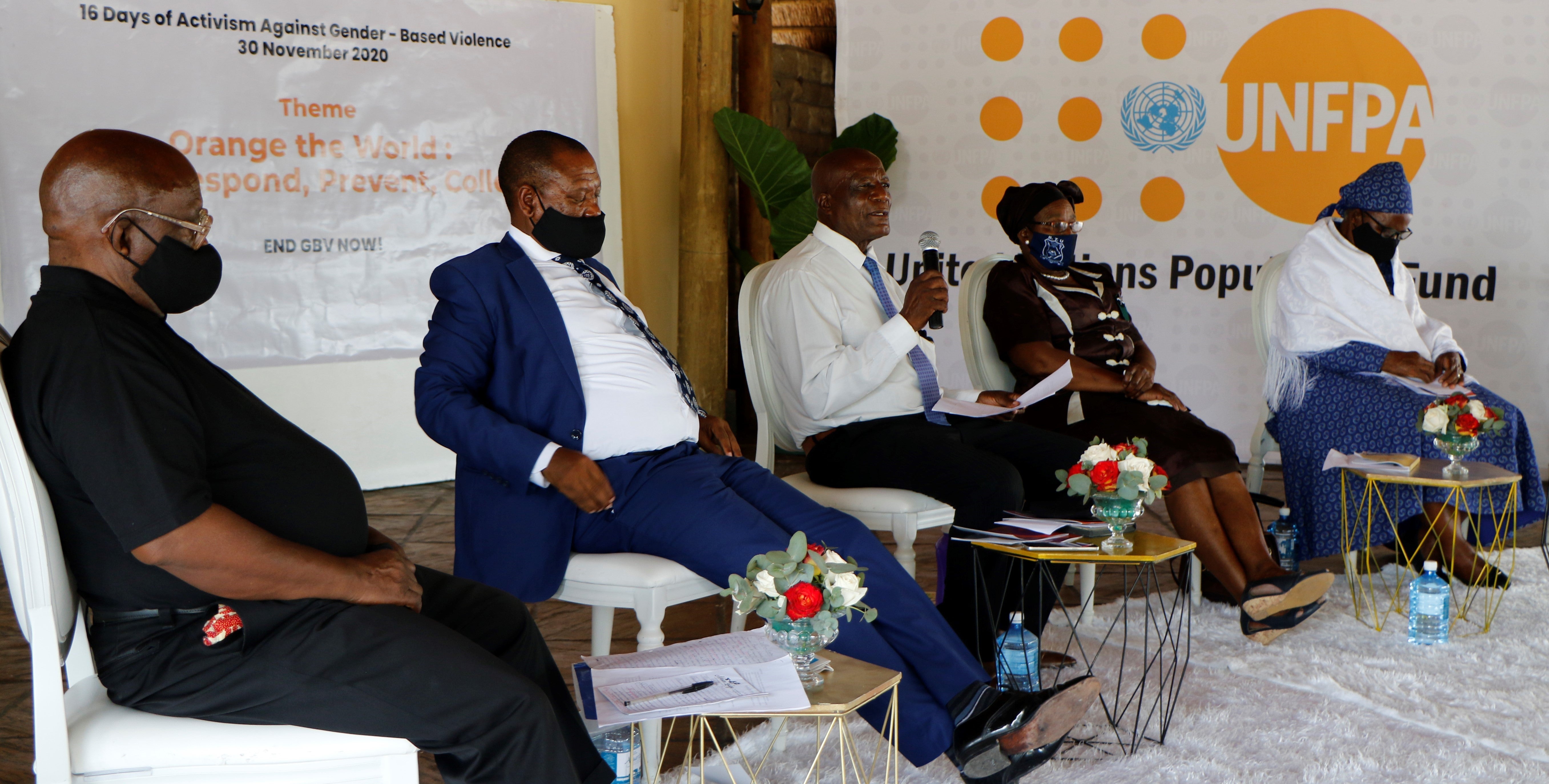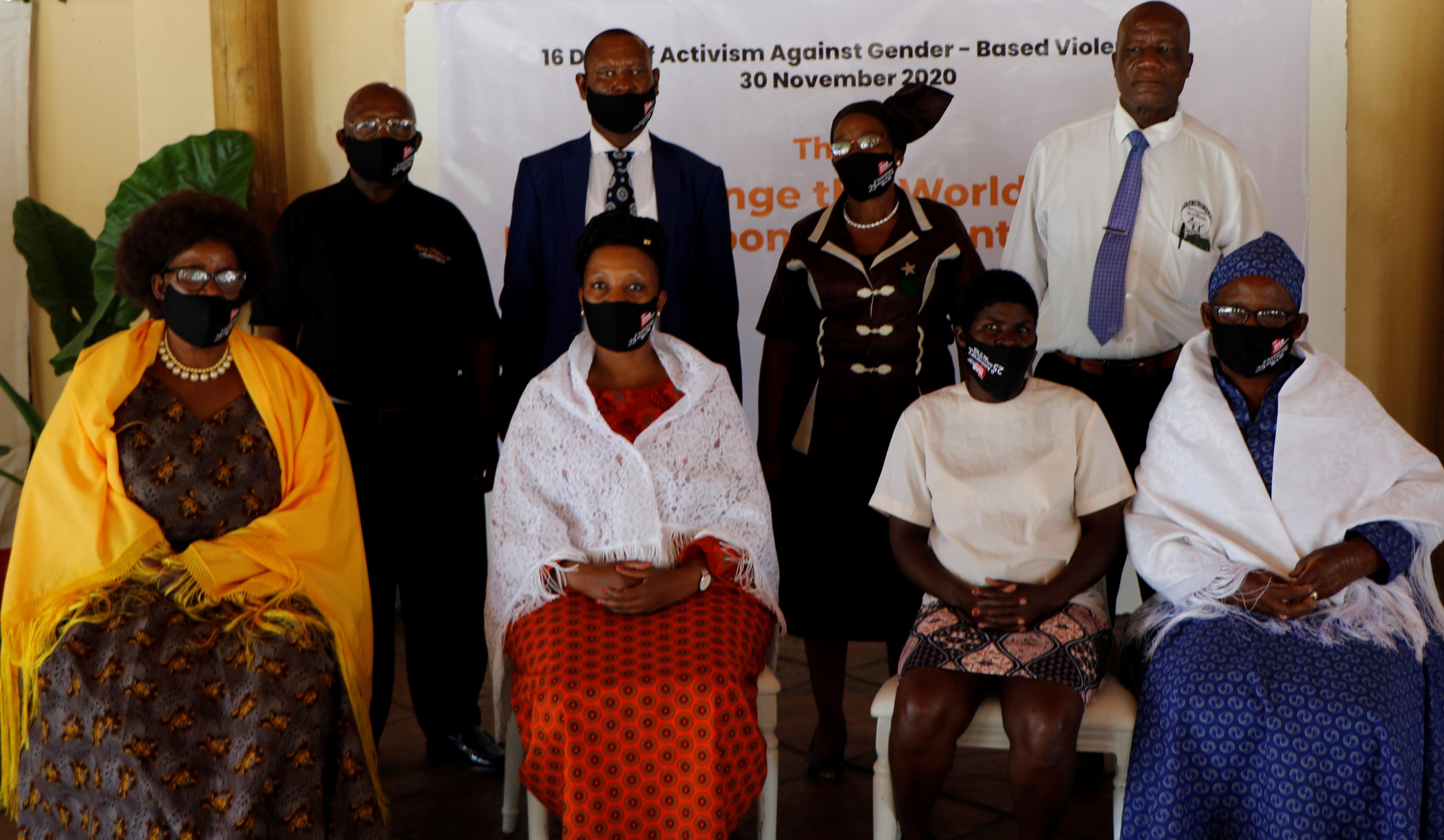Maun, BOTSWANA- “The beauty of culture is when it protects the most vulnerable in society. When a woman or a girl who has suffered gender based violence approaches the Kgotla or the Kgosi, she puts her hope on the traditional leadership to protect her. The question is will she receive redress? Will the Kgotla be responsive to her needs and restore her dignity?" said Ms. Mareledi Segotso, UNFPA Botswana Head of Office.
She made these remarks during a dialogue held to commemorate the 16 Days of Activism Against Gender Based Violence with Dikgosi (traditional leaders) and community elders in Maun, co-hosted by UNFPA and Women Against Rape (WAR) on the 30th November, at the Maun Kgotla.
The dialogue centred on the role of traditional leaders in protecting women and girls from GBV. In many communities in Botswana, GBV cases are mediated by traditional leaders.
Ms. Segotso drew the dialogues’ attention to the intersections of culture, protection of vulnerable populations and the role of the Kgotla system (traditional law court) as a first line response on GBV, reiterating that culture plays an important role in the fight against Gender Based Violence (GBV) as it reinforces respect and smooth relationships among families.
According to Ms Segotso, it was important to engage Dikgosi on issues of GBV as custodians of culture, whose role is to ensure that culture protects vulnerable groups such women and girls.
Change of mindset needed

Mr. Diako, Kgosi Ledimo, Kgosi Majatsie, Kgosi Molaletsi and Ms. Segosebe during the panel discussion.
The traditional leaders acknowledged that GBV is a widespread challenge within their communities and that it mostly affects women and girls. The drivers of violence against women and girls were described as deep-rooted in patriarchal attitudes and gender stereotypes that persist. The preservation of negative cultural practices and traditional attitudes that serve to perpetuate women’s subordination in the family and society were mentioned several times during the panel discussion.
Kgosi Oleyo Ledimo said not all cultural and traditional practices were negative, underscoring that positive traditional methods such as bogwera and bojale (traditional rites ceremonies) could help. He said this practices instilled values in boys and helped to promote norms around positive masculinity and that helped to prevent GBV. Similarly, he said customary marriage rituals such as traditional pre-marriage counselling brings the families together and builds a protective layer for couples as the family then becomes a first line of response and forms a dispute resolution system.
“We had initiatives where boys were taught how to behave and groomed them to be better men in society. These traditions taught boys to know that violence is not part of cultural practices”
One of the panelists, Ms. Tuduetso Segosebe, a community elder lamented that “we do not rebuke unbecoming behaviours of our girls because we want to eat” giving an example that, girls, especially from poor families in rural areas, are often seen as a source of income for their families.
A Womens’ Rights champion and former Minister of Local Government and Rural Development, Ms. Botlogile Tshireletso said that lack of strong bonds between families contribute to gender-based violence. "Violence was minimal in our generation because the society was made up of strong families and powerful principles that guided the choices of community members and and sex offenders were known because they were very few,” she said.
Summing up the dialogue, Kgosi Molaletsi said negative cultural beliefs are used to justify patriarchy. He said as traditional leaders, their role was to actively debunk and expose these myths that are erroneously linked to culture and used to perpetuate gender-based violence.
Addressing the role of the health system in response to GBV, Mr. Qhao, a representative of Maun DHMT highlighted that the health systems have a critical role to play in the GBV response as they are usually the first line of help. He mentioned that while offering clinical services, their role is to identify those who are experiencing violence and provide them with comprehensive health services, including clinical examination, forensic evidence collection as well as provision of PEP and Emergency Contraceptive to prevent both unintended pregnancies and HIV infection. He further highlighted that they work closely with the Police and NGOs such as WAR to provide appropriate care and referrals.
The discussion was instrumental in identifying key areas of concern and related challenges of GBV, strategies that work towards addressing gender inequality and discrimination as well as possible solutions and key advocacy issues.
Traditional leadership is one of the oldest institutions in Botswana and the influence of traditional leaders continues to be strong, especially in rural areas. As heads of their communities, traditional leaders are key decision makers and the custodians of tradition and culture.
-Priscilla Rabasimane


